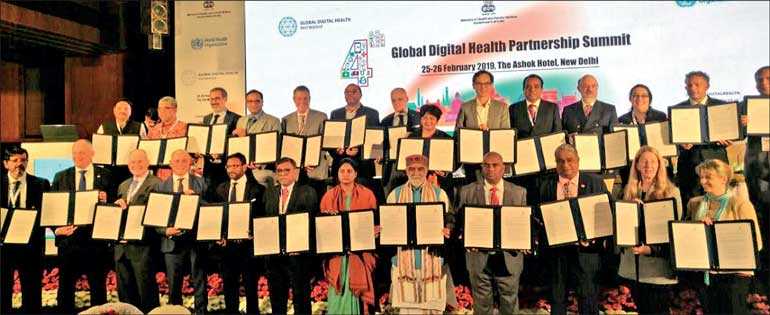Friday Feb 27, 2026
Friday Feb 27, 2026
Wednesday, 6 March 2019 00:00 - - {{hitsCtrl.values.hits}}

Global health leaders and experts on Tuesday adopted ‘Delhi Declaration on digital health for sustainable development’, which called for the WHO to establish a specific mechanism to centrally coordinate digital health to assist its member states.
Ministers and government officials from over 34 countries attended the event to discuss the impact of digital technologies on health systems and health services delivery.
WHO Director-General Dr. Tedros Adhanom Ghebreyesus in his live video address shared, “Digital technologies are not just the latest trend – they are a vital tool for strengthening primary care, achieving universal health coverage, and achieving Sustainable Development Goals.”
Following is the Delhi Declaration on Digital Health for Sustainable Development
The participating individuals and entities or the Fourth Summit or the Global Digital Health Partnership,
Having discussed the high relevance of digital health to attain sustainable development goals and to improve the health and well-being of their citizens at national and sub- national levels through the best use of evidence-based digital technologies;
Highlighting the relevance and widespread use of Internet of Things, Artificial Intelligence, Machine Learning, Geographic Information Systems, Advance Computing, Big Data Analytics, Biometrics, Telehealth, and numerous other digital health innovations in health sector;
Recalling the unanimous adoption of the World Health Assembly resolutions WHAS8.28 (2005) on eHealth, WHA66.24 (2013) on eHealth standardization and interoperability and WHA71.7 (20IS) on Digital Health;
Reaffirming the ongoing multisectoral national efforts in the innovative use of digital health efforts to strengthen health systems, health promotion, disease prevention and health services delivery within the national and sub-national context;
Recognizing the importance of the adoption and adaptation of relevant norms and standards for effective interoperability data and information systems;
Recognizing the importance of privacy, security, confidentiality, data localization in the context of digital health;
Stressing the growing threat to Cyber Security, the body of technologies processes and practices designed to protect networks, computers, programs and data from attack, damage and unauthorized access;
Recognizing the need for evidence and evaluation of digital health efforts to ensure its appropriate use in services for patients, clinicians and health systems, and test new models of care; and
Emphasizing the importance of public-private partnership to finance and promote the full use of digital health to advance health-related Sustainable Development Goals at national and sub-national levels:
Adopted, by Global Digital Health Partnership participants in New Delhi, on 26 February 2019, the Joint Declaration on Digital Health for Sustainable Development to accelerate and implement the appropriate Digital Health interventions to improve health of the population at national and sub-national levels, as appropriate according to national context, through the following actions by 2023:
1. Ensure that national and/or subnational health authorities have an updated digital health strategy;
2. Establish or modify, when necessary, the national and sub-national mandate for digital health through appropriate national and sub-national policies, procedures, legislation that governs digital health in national and subnational context;
3. Assess the status of digital technologies for health, including in health information systems at the national and subnational levels in order to identify areas of improvement and to meet the national and sub-national health-related SDGs:
4. Prioritize, as appropriate, the development, evaluation, implementation, scale-up and greater utilization of digital technologies to enable full realization of national and subnational strategic health development objectives;
S. Establish or strengthen existing national and sub-national mechanisms to facilitate inter-agency cooperation for digital health in the national and sub-national context;
6. Ensure full use of appropriate norms and standards to ensure interoperability of data and systems and ensure implementation of all cyber security measures and reflect on lessons learned from participant countries and implement cyber security measures that Will enable us to act globally to a major incident;
7 Accelerate the rapid and full use of digital health innovations to strengthen health
sector through public-private partnerships;
8. Promote equitable, affordable and universal access to health for all, including the special needs of groups that are vulnerable by facilitating full access to all digital health interventions;
9. Periodically sharing of knowledge and resources to advance transnational and international cooperation and collaboration in digital health; and call on nations to participate in the Global Digital Health partnership as a vehicle for these activities.
10. Ensure that in consonance with the WHA 71.7 (2018) on Digital Health, World Health Organization to prepare a road map and facilitate the member states in realizing their digital health strategies.